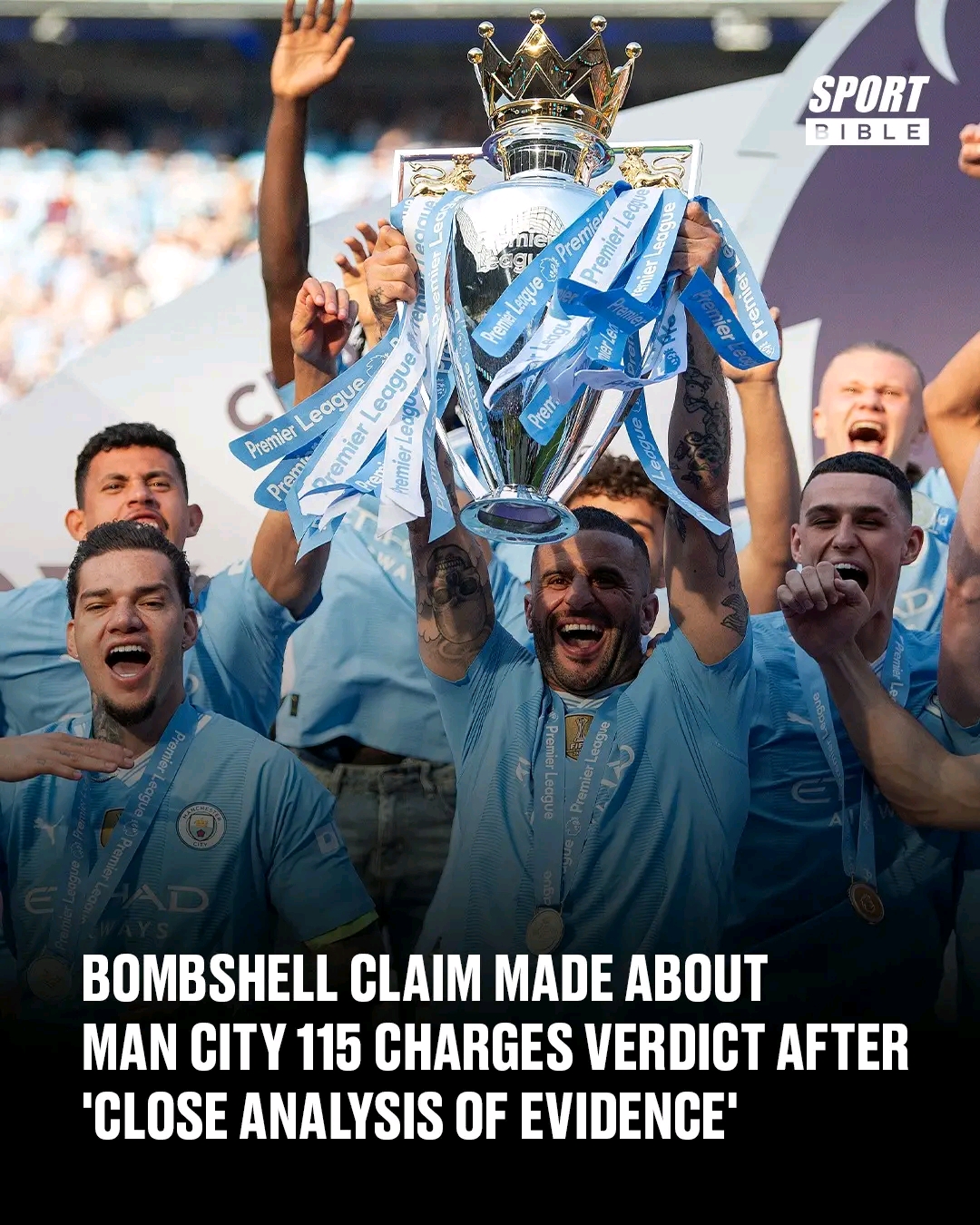Manchester City’s 115 Charges: A Comprehensive Analysis of the Bombshell Verdict Claims

The football world continues to hold its breath as Manchester City’s historic 115-charge case remains unresolved, with recent bombshell claims suggesting the outcome may favor the Premier League champions. What began as one of the most significant financial investigations in football history has evolved into a protracted legal battle that could reshape the landscape of English football forever.
Manchester City’s legal troubles stem from allegations dating back over a decade, with the Premier League formally charging the club in February 2023 with 115 breaches of financial regulations spanning a nine-year period from 2009 to 2018. These charges represent the most comprehensive investigation into a Premier League club’s financial conduct in the competition’s history, dwarfing previous cases in both scope and potential consequences.
The investigation’s roots can be traced to the 2018 Football Leaks revelations, which exposed a treasure trove of internal documents from various football clubs across Europe. Among the most damaging revelations were communications suggesting that Manchester City may have artificially inflated sponsorship deals and concealed the true source of funds used to comply with Financial Fair Play regulations. These leaked documents provided the Premier League with the ammunition needed to launch their extensive investigation.
The timing of the charges was particularly significant, coming at a moment when City were enjoying unprecedented success on the pitch. Having won the Premier League title in 2022 and on course for another championship, the club found itself fighting battles on two fronts – pursuing glory in stadiums while defending their reputation in boardrooms and courtrooms.
The sheer number of charges against Manchester City reflects the complexity and breadth of the alleged misconduct. Breaking down these 115 charges reveals five distinct categories of alleged violations, each carrying its own implications for the club’s future.
The most numerous category involves 54 alleged breaches related to the failure to provide accurate and up-to-date financial information between 2009-10 and 2017-18. These charges suggest a systematic pattern of financial misrepresentation that spans nearly a decade of the club’s operations under the ownership of Sheikh Mansour and the Abu Dhabi United Group.
The second-largest category encompasses 35 alleged breaches concerning the club’s failure to cooperate with Premier League investigations between December 2018 and February 2023. This category is particularly damaging as it suggests ongoing obstruction of justice even after the initial allegations came to light. Such non-cooperation charges often carry severe penalties in regulatory proceedings, as they undermine the integrity of the investigative process itself.
Fourteen charges relate to the failure to provide accurate financial reports specifically regarding player and manager compensation during the same period. This category touches on one of the most sensitive areas of football finance – the true cost of assembling and maintaining a competitive squad. If proven, these charges could suggest that City’s reported wage bills were significantly understated, potentially giving them an unfair competitive advantage in the transfer market.
Seven charges concern breaches of the Premier League’s Profitability and Sustainability Regulations between 2015-16 and 2017-18. These regulations, similar to UEFA’s Financial Fair Play rules, are designed to prevent clubs from spending beyond their means and ensure long-term financial stability across the league.
Finally, five charges relate to failure to comply with UEFA’s regulations, including their Club Licensing and Financial Fair Play regulations. This category creates an interesting parallel with City’s previous successful appeal to the Court of Arbitration for Sport, which overturned UEFA’s initial sanctions in 2020
The independent commission hearing began in September 2024, marking the start of what many expected to be a conclusive phase in this long-running saga. The three-person Independent Commission panel, comprised of legal and football industry experts, was tasked with examining mountains of evidence, witness testimony, and legal arguments from both sides.
The hearing’s duration – spanning from September through December 2024 – immediately signaled the complexity of the case. Unlike typical regulatory hearings that might conclude within days or weeks, this 12-week marathon suggested that both sides had substantial evidence to present and significant legal ground to cover.
Initially, there were expectations that a verdict would be announced before the end of the 2024-25 season. Manager Pep Guardiola himself had suggested this timeline, indicating that the club anticipated a relatively swift resolution once the hearing concluded. However, as months have passed since the December conclusion, it has become increasingly clear that the decision-making process is far more complex than initially anticipated.
The extended deliberation period has sparked intense speculation about what the delay might indicate. Some legal experts suggest that lengthy deliberations often signal disagreement among panel members or uncertainty about the evidence presented. Others argue that the sheer complexity of the case and the magnitude of potential consequences naturally require extensive consideration.
The most significant recent development came from Daily Mail journalist Ian Herbert, whose analysis has sent shockwaves through the football community. Herbert’s article, boldly titled “The bombshell result of Manchester City’s 115 charges case is now clear and here’s why,” presents a compelling argument based on his interpretation of the available evidence and circumstances surrounding the trial.
Herbert’s central thesis rests on what he describes as “close analysis of the evidence, and the circumstances of the trial itself.” His conclusion – that Manchester City will likely prevail in the case – represents a dramatic shift from the widespread expectation that the club would face severe sanctions.
The journalist draws a crucial parallel with Manchester City’s previous encounter with UEFA over similar allegations. In that case, UEFA’s investigation lasted just two days before finding City guilty and imposing a two-year Champions League ban along with substantial fines. However, City’s subsequent appeal to the Court of Arbitration for Sport proved successful, with the sanctions being overturned due to insufficient evidence and procedural issues.
Herbert argues that the stark contrast between UEFA’s rapid decision-making and the current prolonged deliberation suggests a fundamentally different evidentiary landscape. While UEFA felt confident enough to reach a guilty verdict within 48 hours, the Premier League’s commission has now deliberated for over 180 days without reaching a conclusion.
This extended timeline, Herbert suggests, points to significant uncertainty about the strength of the evidence against City. If the case were clear-cut, he argues, the commission would have reached a decision much more quickly. The fact that expert legal minds are taking months to analyze the same basic allegations that UEFA addressed in days suggests that the evidence may not be as compelling as initially believed.
Football finance expert Kieran Maguire has provided crucial context for understanding the challenges facing the commission. Maguire’s analysis highlights the extraordinary burden of proof required to sustain the charges against Manchester City.
For the commission to find City guilty, Maguire explains, they would need to conclude that senior figures at both Manchester City and their major sponsors – including Abu Dhabi’s Etihad Airways and telecommunications company Etisalat – engaged in coordinated financial deception. This would require proving not just isolated instances of misconduct, but a systematic conspiracy involving multiple organizations across different jurisdictions.
The involvement of external auditors adds another layer of complexity to the case. BDO LLP, Manchester City’s external accountants, would have conducted extensive analysis of the club’s finances throughout the period in question. For the charges to be sustained, the commission would need to conclude either that BDO was complicit in fraudulent activity or that they were somehow completely deceived about the true nature of the club’s financial arrangements.
Neither scenario is particularly plausible from a practical standpoint. Major accounting firms like BDO have rigorous procedures and professional obligations that make complicity in fraud extremely unlikely. Similarly, the suggestion that sophisticated auditors could be completely fooled about fundamental aspects of their client’s finances strains credibility.
The legal standard for proving financial misconduct in regulatory proceedings is typically “balance of probabilities” rather than “beyond reasonable doubt.” However, even under this lower standard, the complexity of the alleged conspiracy and the involvement of multiple reputable organizations creates significant challenges for the prosecution.
The extended delay in announcing a verdict has become a story in itself, with legal experts offering various explanations for the prolonged deliberation period. Maxime van den Dijssel of Brandsmiths law firm, a sports lawyer specializing in arbitration, has suggested that the delay is not unusual given the complexity and magnitude of the case.
Van den Dijssel’s prediction that the case could continue for “another couple of years” when factoring in potential appeals highlights the marathon nature of such proceedings. Even if the commission reaches a decision in the coming months, the losing party would almost certainly appeal, potentially to the Court of Arbitration for Sport or through the English court system.
The delay also raises questions about the commission’s internal dynamics. Independent panels of this type typically aim for unanimous decisions, particularly in cases of such significance. If the three panel members hold different views about the evidence or appropriate sanctions, reaching consensus could prove extremely challenging.
From a procedural standpoint, the commission faces an unprecedented burden in analyzing the evidence. The case involves thousands of documents, multiple witness testimonies, and complex financial arrangements spanning nearly a decade. Unlike simpler regulatory violations, this investigation requires deep understanding of international finance, sports marketing, and regulatory compliance across multiple jurisdictions.
Throughout the process, Manchester City has maintained a posture of complete denial and confidence. The club’s leadership has consistently described the charges as baseless and has expressed complete confidence in their eventual exoneration. This confidence appears to be based on what they describe as “irrefutable evidence” of their innocence.
City’s defense strategy likely centers on several key arguments. First, they can point to their successful appeal of UEFA’s similar charges, which was overturned due to insufficient evidence and procedural flaws. This precedent suggests that the underlying allegations may not be as strong as they initially appeared.
Second, the club can argue that their financial arrangements, while complex, were entirely legal and properly disclosed to relevant authorities. The involvement of reputable external auditors and legal advisors supports this argument, as does the fact that many of the alleged violations concern disclosure and reporting rather than fundamental illegality.
Third, City can challenge the Premier League’s jurisdiction and investigative procedures, potentially arguing that the charges exceed the league’s regulatory authority or that procedural errors undermined the investigation’s integrity.
The club’s confidence throughout the process suggests they believe their defense strategy is strong. Unlike organizations facing serious regulatory charges, City has not engaged in settlement negotiations or shown any inclination to accept reduced penalties in exchange for admitting guilt.
The eventual outcome of Manchester City’s case will have profound implications for English football regardless of the verdict. If City is found guilty and faces severe sanctions such as relegation or points deductions, it would represent the most dramatic regulatory intervention in Premier League history.
Such an outcome would raise questions about the validity of City’s recent achievements and could trigger demands for title strips or competition restructuring. The financial implications would be enormous, not just for City but for their competitors who might seek compensation for lost opportunities during the period of alleged misconduct.
Conversely, if City successfully defends against the charges, it would represent a significant victory for club autonomy and could limit the Premier League’s ability to pursue similar investigations in the future. Such an outcome might also encourage other clubs to challenge existing financial regulations or resist cooperation with league investigations.
The case has already changed the landscape of football regulation, encouraging other leagues and governing bodies to strengthen their investigative procedures and evidential standards. Regardless of the outcome, the Manchester City case will serve as a precedent for how football authorities approach complex financial investigations.
Manchester City’s case sits within the broader context of ongoing debates about Financial Fair Play regulations and their effectiveness in promoting competitive balance and financial sustainability. Critics of current regulations argue that they primarily serve to protect established elite clubs by preventing newer entrants from investing heavily to compete.
Supporters of financial regulation point to examples of clubs that have faced financial ruin due to unsustainable spending and argue that rules are necessary to protect the long-term health of football. The Manchester City case represents a crucial test of whether these regulations can be effectively enforced against well-resourced clubs with sophisticated legal representation.
The outcome will likely influence future regulatory approaches across European football. If the charges fail, it may encourage governing bodies to develop more robust investigative procedures and evidential standards. If they succeed, it could deter similar alleged misconduct and strengthen the credibility of financial regulation.
As the football world continues to await resolution of Manchester City’s 115 charges case, recent analysis suggests that the club may be in a stronger position than many initially believed. The extended deliberation period, combined with the complexity of proving systematic financial misconduct involving multiple organizations, has led some experts to conclude that City will likely avoid the most severe sanctions.
However, the case remains far from resolved, and the eventual outcome will depend on the commission’s detailed analysis of extensive evidence and complex legal arguments. Whatever the verdict, this case will be remembered as a watershed moment in football governance, setting crucial precedents for how the sport approaches financial regulation and enforcement.
The delay in reaching a conclusion reflects not just the complexity of the case but also the magnitude of its implications for English football and the broader sports industry. As deliberations continue, all parties involved understand that the eventual decision will shape the future of football governance for years to come.
For Manchester City, their supporters, and their competitors, the wait continues. But if recent expert analysis proves accurate, the eventual resolution may surprise those who expected severe sanctions against one of English football’s most successful recent clubs. The truth, as always in complex legal proceedings, will ultimately emerge through careful consideration of evidence and law rather than speculation and expectation.















